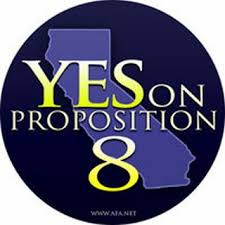Prop. 8 backers: Marriage promotes procreation
prop 8Winding up a historic trial over same-sex marriage in California, the lawyer for Proposition 8's sponsors told a federal judge Wednesday that allowing only men and women to wed promotes responsible sex and child-rearing, and ultimately ensures the future of humanity.
During more than two hours of intense and sometimes skeptical questioning by Chief U.S. District Judge Vaughn Walker, attorney Charles Cooper maintained that society is entitled to reserve its approval of marriage for those who can naturally conceive children.
"The marital relationship is fundamental to the existence and survival of the race," Cooper said in closing arguments before a packed San Francisco courtroom. The reason the state regulates marriage, he said, is to steer "procreative sexual relationships" into a stable family environment so that children can be raised by their biological parents.
Other federal courts have relied on that argument to uphold measures such as Prop. 8, a November 2008 initiative that prohibited same-sex marriages in California less than six months after the state Supreme Court had legalized them.
Judge skeptical
But Walker, who presided over the nation's first federal trial on the issue, sounded dubious. He note that the state allows couples unable or unwilling to have children to marry, suggesting that the institution has a broader purpose that same-sex partners might equally fulfill.
"Marriage is a right which extends fundamentally to all persons, whether they're capable of producing children, incarcerated or behind in their child-support payments," Walker said, citing Supreme Court rulings that allow people in all those situations to marry.
People marry not to benefit the state, but because they believe that "I'm going to get a life partner, who I'm going to share my life with and maybe have children," the judge said. "Why don't those same values apply to gay couples and lesbian couples loving one another?"
Cooper replied that same-sex couples are incapable of "irresponsible procreation," which he said marriage laws are designed to discourage.

Bias would be OK
He also said California has provided equal treatment for all couples in its domestic-partner laws. But even a discriminatory marriage law would be valid, Cooper said, because the U.S. Constitution offers no special protection to gays and lesbians and "we don't have to submit evidence" to justify treating them differently.
Theodore Olson, lawyer for two same-sex couples who sued for the right to marry, responded indignantly. Prop. 8, he said, "takes a group of people who have been victims of discrimination" historically, and prevents them from "participating in the most fundamental relationship in life."
Gays and lesbians, Olson said, seek to wed for the same reasons as everyone else, to be in a committed, socially accepted family relationship with the one they love. "Tell me how it helps the rest of the citizens of California to keep them out of the club," he said.
Walker did not say when he would rule. His decision is certain to be appealed and could reach the Supreme Court within two years.
Evolving institution
The arguments followed 12 days of testimony in January, almost entirely on the plaintiffs' side - from the gay and lesbian couples, who spoke of their longing for full acceptance, and from eight academic witnesses who described marriage as an evolving institution that once contained racial restrictions and would be strengthened if it became more inclusive.
The only witnesses for Prop. 8's sponsors were political scientist Kenneth Miller, who said gays and lesbians can protect their political interests without judicial protection, and David Blankenhorn, an author and advocate who said allowing same-sex marriages could lead to more divorces and fewer weddings for men and women.
At Wednesday's hearing, Walker asked Cooper whether Blankenhorn, who heads the Institute for American Values but lacks academic credentials, qualified as an expert witness. Cooper said Blankenhorn was a recognized expert in his field and Olson hastened to endorse him, saying Blankenhorn's testimony helped to discredit Prop. 8.
He cited Blankenhorn's statements that marriage would benefit gay and lesbian couples and their children, and that "we would be more American on the day we permitted same-sex marriage than we were the day before."
'Slur' on voters
But Cooper said the male-female definition of marriage has been accepted "across cultures, across time," and that the plaintiffs' claim that Prop. 8 was rooted in prejudice is "a slur on 7 million Californians" who voted for the measure.
The plaintiffs were joined by the city of San Francisco, which argued that Prop. 8 promotes discrimination that leads to higher municipal health and welfare costs. Therese Stewart, the chief deputy city attorney, also told Walker that the ban on same-sex marriage reduces the city's revenue from tourism.
"It's long been the city of love, where people leave their hearts," she said - drawing a broad smile from Mayor Gavin Newsom in the front row.
What's next
What's next in the Proposition 8 case.A ruling by Chief U.S. District Judge Vaughn Walker, probably in July, on whether the ban on same-sex marriage violates the constitutional guarantee of equality.
If Walker overturns Prop. 8, its sponsors will seek a stay from the judge or from the Ninth U.S. Circuit Court of Appeals in San Francisco to keep the ban in effect.
The losing side in Walker's court will appeal to the Ninth Circuit, which might issue a ruling by this time next year.
The loser at the appeals court could appeal to the U.S. Supreme Court. If the court accepts the case, it could issue a ruling in 2012 on either the constitutionality of the California ballot measure or the overall right of same-sex couples to marry.

No comments:
Post a Comment